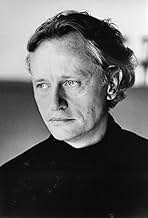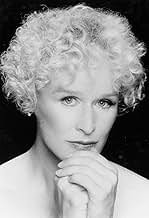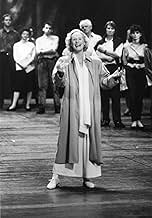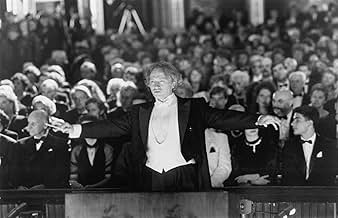IMDb-BEWERTUNG
6,6/10
1466
IHRE BEWERTUNG
Füge eine Handlung in deiner Sprache hinzuHungarian conductor plans bold "Tannhäuser" production amid opera politics, artistic egos, nationalism, union conflicts, and funding challenges in critique of Grand Opera and European Union.Hungarian conductor plans bold "Tannhäuser" production amid opera politics, artistic egos, nationalism, union conflicts, and funding challenges in critique of Grand Opera and European Union.Hungarian conductor plans bold "Tannhäuser" production amid opera politics, artistic egos, nationalism, union conflicts, and funding challenges in critique of Grand Opera and European Union.
- Regie
- Drehbuch
- Hauptbesetzung
- Auszeichnungen
- 3 Gewinne & 2 Nominierungen insgesamt
Kiri Te Kanawa
- Elisabeth (Tannhäuser highlights performed by)
- (Synchronisation)
René Kollo
- Tannhäuser (Tannhäuser highlights performed by)
- (Synchronisation)
Waltraud Meier
- Venus (Tannhäuser highlights performed by)
- (Synchronisation)
Renate Spingler
- A young shepherd (Tannhäuser highlights perfomed by)
- (Synchronisation)
Matthias Hölle
- The Landgrave (Tannhäuser highlights performed by)
- (Synchronisation)
Rodney Macann
- Biterolf (Tannhäuser highlights performed by)
- (Synchronisation)
Johara Farley
- Dancer
- (as Johara Racz)
Dieter Rita Scholl
- Delfin Van Delf
- (as Rita Scholl)
Empfohlene Bewertungen
This movie is really something different. It's all about music. It is about the desperate attempt of an idealistic hungarian conductor to perform "Tannhaeuser" in the opera house of Paris. The problems he encounters are unbelievable... and for us viewers, unbelievably funny.
What really is wonderful about this movie is of course the music. It shows how much passion and love lies within classic music, and how much work there is to do until the staff of such a big production is finally in synch.
This film also offers a chance to get an insight into classical music pieces. Some of the most splendid passages of Wagners "Tannhaeuser" can be listened to in full beauty, and thus the film might tempt some people to overcome their inhibitions and to dive into the world of opera.
For those more interested in characterization there are a lot of weird persons playing in this story, showing different kinds of European lifestyle and tackling topics like prejudice, bureaucracy and of course love.
What really is wonderful about this movie is of course the music. It shows how much passion and love lies within classic music, and how much work there is to do until the staff of such a big production is finally in synch.
This film also offers a chance to get an insight into classical music pieces. Some of the most splendid passages of Wagners "Tannhaeuser" can be listened to in full beauty, and thus the film might tempt some people to overcome their inhibitions and to dive into the world of opera.
For those more interested in characterization there are a lot of weird persons playing in this story, showing different kinds of European lifestyle and tackling topics like prejudice, bureaucracy and of course love.
this movie, besides giving the casual viewer a glimpse into the operatic world, also affords the viewer a casual glimpse into the world and the business, of music making, and it ain't pretty. but it's accurate.
as a professional musician in an international setting for more than 25 years, let me assure you that the evils of the music business are all here on display, and they are represented accurately: complaining musicians, managers for whom the word 'know' was replaced by the word 'no' at an early age (perhaps in their infancy), smarmy interfering union reps, and please God, save us all from short conductors with bleeping inferiority complexes.
and then there are the operatic singers. oh my!! (dr. georg szell called opera singers, " 'unmusical beasts', who have to have every note beaten into them by a vocal coach". this is true, by my experience).
the only really weak moment that i noticed was when the conductor left the podium during a rehearsal to knock on the door of the singer. this is absolutely improbable/impossible in my experience. conductors get their 'power' by being on the podium. they do not leave the podium
orchestra conducters get/force sex by more sordid means, not by leaving the podium.
this movie has a lot to recommend it, on many different levels- check it out.
i give it a 9.2.
watch it in a 'Robert Altman' frame of mind, i think that you will see what i mean.
it's not 'terror in tiny town'. and it's not, 'the godfather, part one'. it's somewhere in between. it's really a fine movie.
thanks. alvink
as a professional musician in an international setting for more than 25 years, let me assure you that the evils of the music business are all here on display, and they are represented accurately: complaining musicians, managers for whom the word 'know' was replaced by the word 'no' at an early age (perhaps in their infancy), smarmy interfering union reps, and please God, save us all from short conductors with bleeping inferiority complexes.
and then there are the operatic singers. oh my!! (dr. georg szell called opera singers, " 'unmusical beasts', who have to have every note beaten into them by a vocal coach". this is true, by my experience).
the only really weak moment that i noticed was when the conductor left the podium during a rehearsal to knock on the door of the singer. this is absolutely improbable/impossible in my experience. conductors get their 'power' by being on the podium. they do not leave the podium
orchestra conducters get/force sex by more sordid means, not by leaving the podium.
this movie has a lot to recommend it, on many different levels- check it out.
i give it a 9.2.
watch it in a 'Robert Altman' frame of mind, i think that you will see what i mean.
it's not 'terror in tiny town'. and it's not, 'the godfather, part one'. it's somewhere in between. it's really a fine movie.
thanks. alvink
The Hungarian conductor Zoltan Szanto (Niels Arestrup) is invited to conduct Tannhäuser by Richard Wagner in Paris. Szanto has to face problems with the ego of the artists, strikes and his family since he falls in lover with the diva Karin Anderson (Glenn Close). But in the end, his love for Karin and passion for Wagner bring redemption to him.
One movie that I regret that has not been released on DVD or Blu-Ray in Brazil is "Meeting Vênus", of 1991 from the critically acclaimed Hungarian director István Szabó and with Glenn Close in the top of her career in the role of a problematic diva.
Using the staging of opera "Tannhäuser" by Richard Wagner in Paris as background, this wonderful feature is a satire of the unification of Europe that was happening in that historical moment through the ego of the musicians from different countries in the orchestra where the character of Glenn Close is the lead attraction.
Just as information, Vênus is the mundane woman or goddess that the troubadour Tannhäuser has sex in the medieval legend that the opera is based.
The mime of Glenn Close, dubbed by Kiri Te Kanawa, is perfect and the climax of this movie is the entrance of the artists singing Pilgrims Chant in the opera house and Szanto's stick blossoming. I have seen this scene several times on my VHS that I have seen at least four times. My vote is ten.
Title (Brazil) : "Encontro com Vênus" ("Meeting Venus")
One movie that I regret that has not been released on DVD or Blu-Ray in Brazil is "Meeting Vênus", of 1991 from the critically acclaimed Hungarian director István Szabó and with Glenn Close in the top of her career in the role of a problematic diva.
Using the staging of opera "Tannhäuser" by Richard Wagner in Paris as background, this wonderful feature is a satire of the unification of Europe that was happening in that historical moment through the ego of the musicians from different countries in the orchestra where the character of Glenn Close is the lead attraction.
Just as information, Vênus is the mundane woman or goddess that the troubadour Tannhäuser has sex in the medieval legend that the opera is based.
The mime of Glenn Close, dubbed by Kiri Te Kanawa, is perfect and the climax of this movie is the entrance of the artists singing Pilgrims Chant in the opera house and Szanto's stick blossoming. I have seen this scene several times on my VHS that I have seen at least four times. My vote is ten.
Title (Brazil) : "Encontro com Vênus" ("Meeting Venus")
I saw this last night on UK TV. Glenn Close looked the part as a diva.
Her mouthing of Kiri Te Kanawa's singing was stunning. I've seen Elizabeth Schwarzkopf and Victoria de los Angeles sing, from the front row, and I would have believed this to be real thing, had it not been a movie.
I can only imagine that Te Kanawa recorded it after Close has shot the scenes. Otherwise, Close is a wonderful mimic.
Anyway, I was charmed by the movie. Simplistic it may be. But then so was Shakespeare in Love. And, as there, a miracle happens when the curtain goes up (except that there was no curtain at the Globe and here it doesn't actually go up, which is where the miracle happens).
David
Her mouthing of Kiri Te Kanawa's singing was stunning. I've seen Elizabeth Schwarzkopf and Victoria de los Angeles sing, from the front row, and I would have believed this to be real thing, had it not been a movie.
I can only imagine that Te Kanawa recorded it after Close has shot the scenes. Otherwise, Close is a wonderful mimic.
Anyway, I was charmed by the movie. Simplistic it may be. But then so was Shakespeare in Love. And, as there, a miracle happens when the curtain goes up (except that there was no curtain at the Globe and here it doesn't actually go up, which is where the miracle happens).
David
A Hungarian conductor tries to unite a multi-national European opera company preparing for a televised production of Wagner's Tannhauser, with mixed results. The same might be said of the film itself, which represents director Istvan Szabo's bid for a wider slice of international box office. Unfortunately, what begins as a mild but engaging Murphy's Law comedy (complete with labor disputes, political arguments, artistic conflicts and so forth) soon devolves into a phony feel-good melodrama, with all the comic frustrations of the early scenes jettisoned in favor of a predictably stormy off-stage romance between the conductor and his temperamental superstar diva (Glenn Close). A few incidental pleasures and an attractive, charismatic cast (presenting the entire European community in a fascinating microcosm) aren't enough to hide all the obvious shortcomings, including (but not limited to) shoddy lip-synching, unnecessary voice-over commentary, and the assumption that listening to Wagner is like dying and going to heaven.
Wusstest du schon
- WissenswertesOpera singer Kiri Te Kanawa dubbed the singing voice of lead actress Glenn Close.
- Zitate
Zoltan Szanto: I could mix up my work with my private life.
- SoundtracksTannhäuser
(extraits)
Music by Richard Wagner
Performed by Kiri Te Kanawa, René Kollo, Håkan Hagegård, Waltraud Meier,
Renate Spingler, Matthias Hölle, Kim Begley, Robin Leggate, Rodney Macann,
, Roderick Earle with The Philharmonia Orchestra (as London Philharmonia Orchestra)
Conducted by Marek Janowski
Top-Auswahl
Melde dich zum Bewerten an und greife auf die Watchlist für personalisierte Empfehlungen zu.
- How long is Meeting Venus?Powered by Alexa
Details
- Erscheinungsdatum
- Herkunftsländer
- Sprachen
- Auch bekannt als
- Meeting Venus
- Drehorte
- Produktionsfirmen
- Weitere beteiligte Unternehmen bei IMDbPro anzeigen
Box Office
- Bruttoertrag in den USA und Kanada
- 1.000.348 $
- Eröffnungswochenende in den USA und in Kanada
- 65.715 $
- 17. Nov. 1991
- Weltweiter Bruttoertrag
- 1.000.348 $
Zu dieser Seite beitragen
Bearbeitung vorschlagen oder fehlenden Inhalt hinzufügen





























